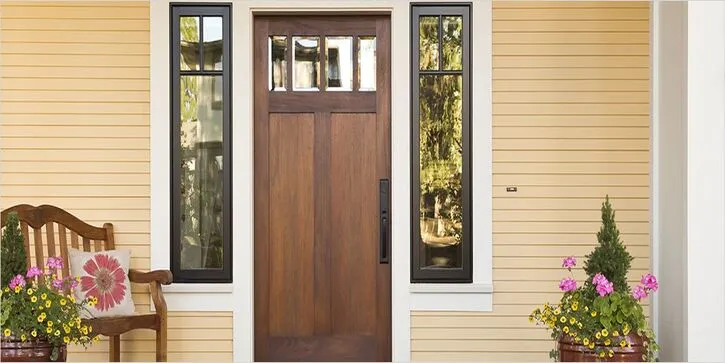Hollow vs. Solid Doors: Which is the Better Choice?
When repairing or renovating your home, you’ll be presented with a number of decisions to make regarding fixtures and finishes. While the paint colors, drawer pulls, and lighting fixtures may only carry aesthetic value, other elements, such as your interior door selections, will have a significant impact on your budget as well as the overall feel, style, and functionality of your space.
The wrong type of door could negatively impact the look, feel, and functionality of your home, while the right door could bring a level of elegance and functionality to your space that is currently missing.
However, before you make a decision on which type of doors are right for you, we’ll help you get familiar with the types and styles available to you.
Types of Interior Doors
In order to maximize your comfort and investment without breaking the bank, give careful consideration when deciding on interior doors.
Wooden doors are heavy and expensive. Solid wood doors are primarily used for the main entrance of a home, but are used for interior doors sparingly. Other options are solid-core and hollow-core doors.
Solid Wood Doors
Not only do doors serve a functional purpose, but they also affect the feel and style of your space. Many homeowners feel that solid wood doors add a richer look and feel to the home.
Solid wooden doors are made entirely out of wood, including the core. They are sometimes embellished with architectural or stylistic details and can be stained or painted however the homeowner desires. Given their strong structure, they are an excellent choice for a main entrance.
Solid Wood Door Pros:
There are a variety of pros to installing a solid wood door, including:
- Excellent insulation and sound-dampening qualities.
- The potential return on investment for buyers.
- Less prone to damage.
- An abundance of options with regard to wood type and style.
- Also available in fire-rated models.
- Easier to repair when damaged.
Solid Wood Door Cons:
Some cons of solid wooden doors include:
- Price, which can be 50 percent higher than the cost of a hollow-core door
- Prone to expansion and/or shrinkage due to fluctuations in temperature or moisture
- More challenging to install due to the added weight
What Is a Solid-Core Door?
Solid-core doors are used for both interior and exterior applications. They come with the benefits of solid wood doors without the high cost. Instead of being made entirely out of wood, they have a synthetic wood core. This allows them to strike a balance between solid wood doors and hollow-core doors.
If you would prefer the features of a solid-core door with the lightweight characteristics of a hollow-core door, check out semi-solid doors. These foam-core doors are essentially hollow-core doors filled with foam to give them better sound insulation characteristics.
Solid-Core Door Pros
Some of the pros of solid-core doors include:
- More affordable than solid wood doors with a real-wood look.
- Resistant to expansion and contraction.
Solid-Core Door Cons
Some of the cons of solid-core doors include:
- Sometimes difficult to install due to the weight.
- Not as many style options.
- Potentially difficult to repair.
What Is a Hollow-Core Door?
Hollow-core doors are lightweight and typically inexpensive. While they do not have any wood in the core, they are used extensively throughout interior spaces because they are less expensive and easier to install.
Hollow-Core Door Pros:
Some of the pros of hollow-core doors include:
- Cost less than solid wood doors.
- Lighter weight and easier to install.
- Less susceptible to expansion and/or contraction.
- Often pre-primed or painted for quicker installation.
Hollow-Core Door Cons:
Some of the cons of hollow-core doors include:
- More easily damaged.
- Harder to repair.
- Provide little in the way of insulation or noise reduction.
- Often feel cheap and flimsy.
Hollow vs. Solid Doors
Considering the average-sized home has approximately 10 interior doors, deciding between hollow vs. solid doors can significantly impact your budget. However, deciding whether to install solid wood, solid-core doors, or hollow doors throughout your home doesn't have to be an all-or-nothing proposition.
Consider compromising with a mix of these three types of doors. Solid wood doors are a great option for your main entrance because they are durable and offer a measure of security. Solid-core doors come in handy where sound may be an issue, such as in bedrooms, bathrooms, and home offices. Hollow-core doors are perfect closet or pantry doors, as those require no insulation or soundproofing, and can be installed and replaced more easily.
Professional Door Installation and Repair
No matter what door type, style, or size you want to install, your local Mr. Handyman is here to help! Our experts can assist you with choosing interior and exterior doors that meet your needs, and install them too!
And with work backed by the Neighborly Done Right Promise™, your satisfaction is guaranteed! To get started, schedule an appointment with a home repair professional at your local Mr. Handyman today!
 Click to call
Click to call



